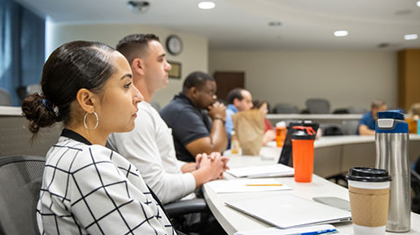A cohort of University of Miami students will travel next week to the Bahamas, where they will consult with owners of local businesses to help develop rebuilding and resiliency strategies to keep the local economy going in the event of another devastating disaster like Hurricane Dorian.
The students’ visit is part of the Bahamas Consulting Project, a collaboration launched a year ago between the University of Miami and the University of The Bahamas, with the goal of creating training workshops that would ultimately benefit the local economy. The focus shifted to rebuilding and resiliency after Dorian pummeled the islands of Grand Bahama and Great Abaco last September.
“This is such an opportunity to learn and help,” said Stephanie Wehby, a second-year M.B.A. student originally from Jamaica who will make the trip. “I’m from the Caribbean, and the storm felt quite personal—it could have been me and my home.”
Zhivargo Laing, professor of economics and executive director of the Government Public Policy Institute (GPPI) at the University of The Bahamas, was on the Coral Gables campus this week. He coordinated logistics and, together with the University of Miami faculty members, offered students a primer on the cultural, environmental, and business challenges the Caribbean nation has faced since Dorian left 70,000 of its 400,000 people homeless.
“You won’t see the physicality of destruction on Grand Bahama, our main island, though you will see that on our eastern island of Abaco,” Laing told students in the action project interdisciplinary class offered at the Miami Herbert Business School that also includes students from the School of Law and College of Arts and Sciences. “But the businesses on the main island are trying to recover from the flooding—they were all under 5-to-6-feet of water. Commerce has been severely disrupted and if you have limited commerce, you have limited employment and limited affordability—and a vicious cycle that becomes a long-term reality,” he added.
Zhihao Chen, also a second-year M.B.A. student, is taking the action project class again this year.
“Last year we learned the concepts from the book, and now this is a real-life experience, a chance to put what we learned to work,” said Chen, who spent his summer backpacking in Mexico, Cuba, and Argentina to learn about the region and strengthen his Spanish.
Over a three-day weekend in Freeport, students will meet and brainstorm with four Bahamian businesses, selected by the GPPI as representative of the most important industries—fisheries, communications, wholesale, and retail. First, though, they will tour Grand Bahama, and its eastern end where most visible damage occurred, to understand the scope of the disaster.
“When you experience a disaster from the ground level, you see what it does to communities, to countries—and solutions are not possible without clarity about the problem,” Laing said. “It’s my hope that students, in real-time and in a real way, absorb the totality and immensity of things like this.”
The Bahamas, he pointed out, has historically suffered a cycle of hurricanes, but nothing that compares to the wrath unleashed by Dorian. Prior to the storm, the Bahamas was second only to the United States and Canada in terms of highest per-capita income in the region, he said, though noting that tourism—with more than six million visitors a year—is by far the main driver.
The semester-long action project also seeks to generate strategies for resiliency against future storms and seeks to develop a climate change resiliency center at the University of The Bahamas.
Kathleen Sullivan Sealey, an associate professor with expertise on coastal restoration ecology, and small island development, and sustainable finances, briefed students on the growing poverty, high cost of living, and the environmental and financial challenges the commonwealth faces.
“There is limited credit available, and the use of credit is very ‘creative,’” Sealey explained, adding that the lack of regulation “creates a huge problem for businesses.”
“Many Bahamians do not separate their personal finances from their professional, and that increases vulnerability and caused an even bigger human tragedy from this hurricane,” said Sealey, who will travel with the group to Freeport.
Alex Niemeyer, an associate professor at Miami Herbert Business School who teaches the action project class, outlined the consultancy project’s three objectives: for students to learn to apply consulting in a real-world setting, to help neighboring friends who are in need, and to help students gain an understanding of the longer-term reality of climate change—in this case, prompted by a weather event.
“Many don’t realize there will be cities and communities that will be drenched out,” Niemeyer said. “They’ll get a real understanding of the massive impact of the disaster and an appreciation that will enable them in leadership roles to make much more sane policy decisions.”

